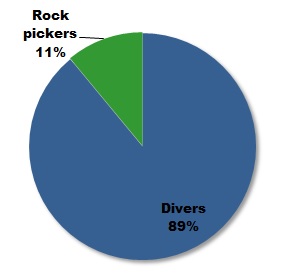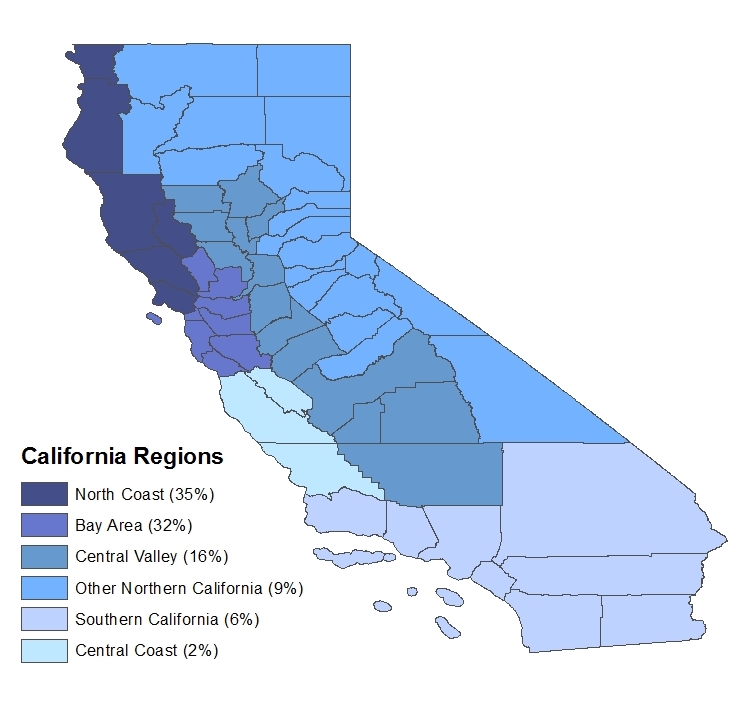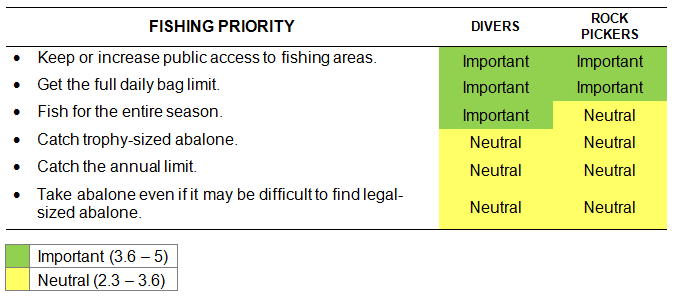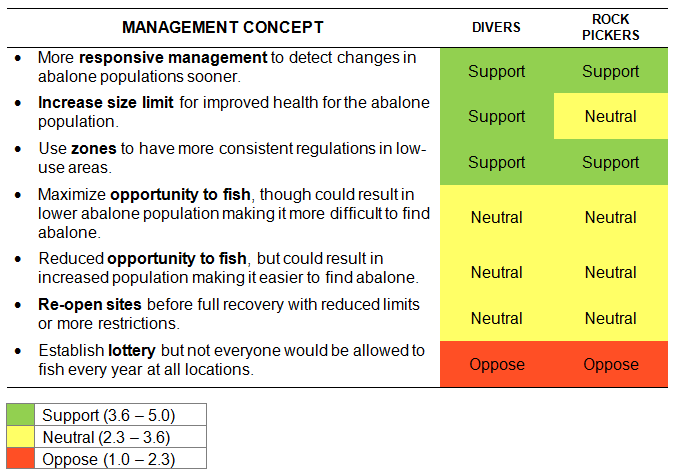The California Department of Fish and Wildlife (CDFW) conducted a survey of abalone fishermen in February 2015 to determine the fishermen’s priorities and preferences regarding the northern California red abalone recreational fishery and management practices. Results of the survey will be used to guide the development of the Red Abalone Fishery Management Plan (FMP).
Executive Summary
- Strong support for maintaining public access to fishing spots.
- Support for adaptive management of the fishery.
- No support or opposition (neutral) for early re-opening of closed areas prior to full recovery.
- Strong opposition to implementation of a lottery system for abalone cards.
- Support for a $30 report card fee to support sustainable adaptive management and enforcement.
- Broad representation of survey respondents across California regions, with the majority living in northern California.
Additional summaries of survey results (PDF)
Characteristics of Respondents
- Over 1,600 respondents completed the survey.
- Eighty-nine percent of respondents were divers.
- Over 80 percent of responses came from the North Coast, Bay Area, and Central Valley.
- Sonoma County had the highest number of respondents.
 Proportion of survey participants who identify as either a diver or rock picker according to their methods in taking abalone.
Proportion of survey participants who identify as either a diver or rock picker according to their methods in taking abalone.
 Location of survey participants, and proportion of overall responses.
Location of survey participants, and proportion of overall responses.
Fishing Priorities
Respondents were asked to rate a list of priorities associated with their fishing activity. Detailed results (PDF).
Top 3 Priorities
- Keep or increase public access
- Get the full daily bag limit
- Fish for the entire season
Divers and rock pickers identified the same top three priorities. Keeping or increasing public access to fishing areas was rated the highest by both groups.
 Ratings of fishing priorities based on a scale from 1(not important) to 5 (extremely important). Listed in order of importance based on weighted average.
Ratings of fishing priorities based on a scale from 1(not important) to 5 (extremely important). Listed in order of importance based on weighted average.
Fishery Management Preferences
Survey participants were asked to rate the strength of their support or opposition for fishery management options, given potential benefits or compromises. The level of support for each management concept altered slightly with each introduced trade-off. Detailed results (PDF).
Key Results
- Strong support for adaptive management.
- No support or opposition (neutral) for early re-opening of impacted areas prior to full recovery to allow populations to replenish.
- Strong opposition to a lottery system that would limit the number of fishers allowed in specific areas.
 Ratings of selected management concepts based on a scale from 1 (strongly oppose) to 5 (strongly support). Listed in order of importance based on weighted average.
Ratings of selected management concepts based on a scale from 1 (strongly oppose) to 5 (strongly support). Listed in order of importance based on weighted average.
Report Card Fees
Survey participants were asked what level of cost they would be willing to pay and if they would support a progressive report card fee system. Detailed results (PDF).
Key Results
- Support for increasing report card fee to $30.
- No support for a progressive fee option.
Abalone management and enforcement is supported in part through the sale of the abalone fishery report cards. Increasing the cost of cards could support more active management, increase monitoring of the resource, and enhance enforcement. Increased card costs could also result in declines in card sales, particularly among those who are on fixed incomes, or those who are not very active in the fishery. A progressive report card option would allow multiple lower-limit, lower-cost cards to be issued to each fisher, potentially alleviating some of the financial pressure on individuals who only take a few abalone.